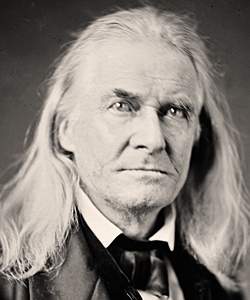Edmund Ruffin (American National Biography)
Scholarship
Although Ruffin's secessionist stance had crystallized at least as early as 1850, it was not until the last four years of the antebellum period, following his retirement from farming and the division of his property among his surviving children, that his crusade for disunion became most intense. Wherever he traveled--at Virginia summer resorts; at the Southern Commercial Convention in Montgomery, Alabama; in hotel lobbies from Washington, D.C., to Charleston, South Carolina; on steamboats and in railroad cars--Ruffin preached the message that southern rights could be preserved only through secession and the creation of a separate nation. Even more significant were his voluminous writings. These included two lengthy pamphlets, "The Political Economy of Slavery" and "African Colonization Unveiled," both published in 1858; an article, "Consequences of Abolition Agitation," which was serialized in De Bow's Review (1857), and another in The South (1858), calling for the removal, through enslavement or forced exile, of the bulk of the free black population in Virginia; a 426-page political novel entitled Anticipations of the Future (1860), which was inspired by John Brown's (1800-1859) raid on Harpers Ferry; and dozens of newspaper pieces, many printed as editorials in the Charleston Mercury. Despite these exertions, Ruffin had little influence in actually effecting secession. Certainly his voice was not heeded in Virginia.
William K. Scarborough, "Ruffin, Edmund," American National Biography Online, February 2000, http://www.anb.org/articles/04/04-00873.html.






